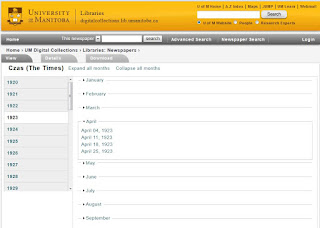Winnipeg Tribune Personality Newsclippings Index,
Winnipeg Tribune fonds, A81-12
Poster of the First Lecture with Serhiy Holovaty
Poster of the Second Lecture with Chrystia Freeland
Poster of the Thirteenth Lecture with Andrei Kurkov
On March 8, 2018, the J.B. Rudnyckyj Lecture Series presented its 25th talk, with guest speaker, Andreas Umland. The roots of the lecture series go back to June 1992, when the late Dr. Jaroslav B. Rudnyckyj established the J.B. Rudnyckyj Endowment Fund. The newly created fund was to facilitate the growth and promotion of the Slavic Collection (Elizabeth Dafoe Library), by way of new acquisitions, as well as the preservation, maintenance and growth of the Slavic portion of the U of M Archives & Special Colelctions. In addition, the funds was to sponsor an annual lecture series, that would bring to the University of Manitoba, an internationally acknowledged scholar, to speak on a topic of interest to those pursuing Eastern European and/ or Slavic Studies.
The very first J.B. Rudnyckyj Distinguished Lecture took place on November 3, 1994 with guest speaker, Serhiy Holovaty, independent Ukraine's first Minister of Justice. Since that time, the lecture committee has invited numerous esteemed scholars and personalities to come speak at the University of Manitoba. Some of the past Rudnyckyj Lecture guest speakers include: Chrystia Freeland, former deputy editor of the Financial Times and current Canadian Minister of Foreign Affairs; noted Canadian journalist, Victor Malarek; former Minister of Environmental Protection, and Ukraine's former ambassador to Canada, Yuri Scherbak; contemporary Ukrainian writer and activist, Oksana Zabuzhko; acclaimed Ukrainian writer and novelist, Andrei Kurkov; prominent author and historian; Timothy Snyder; and the Mykhailo Hrushevsky professor of Ukrainian history at Harvard University, Serhii Plokhy.
Jaroslav Bohdan Rudnyckyj was born in 1910 in
Peremyshl, Galicia. He studied at the University of L’viv, where he obtained
his M.A. in 1934, and his Ph.D in
1937, having specialized in Slavic
philology and the onomastics (geographical place names) of eastern Europe. To
continue these and other studies abroad, he left his homeland in 1937, staying
for a short time in Berlin, Rome, and Paris, before lecturing in Slavic
philology at the Ukrainian Free University in Prague.
In 1949, shortly after his immigration to Canada, he was appointed chairman of
the newly created Department of Slavic Studies at the University of Manitoba, a position
he held until 1976. He also served as a professor with the Ukrainian Free
University in Munich (1943-1980).









.jpg&container=blogger&gadget=a&rewriteMime=image/*)